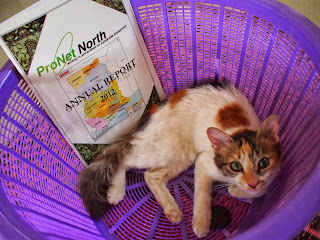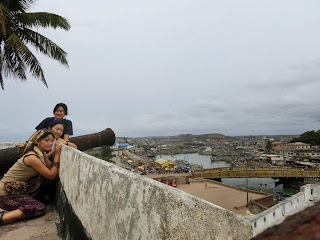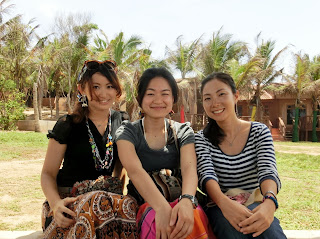*写真について:今回の投稿に関連する写真を持っていないので、最近のお気に入りの二枚を載せます*
*Regarding the pictures: I don't have any pictures relevant to my blog entry this time, so I am uploading two recent pictures that I happen to like*
中学生のときに行ったサマースクールでとても面白い科学の先生に出会ったことがあります。科学の基礎を勉強する授業だったのですが、技術的な基礎だけではなく、科学に付きまとう倫理の問題などについても教えてくれました。毎晩、宿題でその当時の最新技術に関する記事を渡され、それが倫理的に正しいかどうか1ページにまとめるようにと言われました。私はその答えのない記事に悩み、意見を書いていつも複数ページに渡る答えを出していました。
そんな数ページの回答が続いたある日、先生がノートに書いたコメントが
「世界の問題が全てあなたの問題ではない!」というものでした。
先生のお話では、私があまりに色々なことを考えすぎるので少し心配になられたようでしたが、恐らくそんなに深く考えて書かれた言葉ではないと思います。だから、私が今でもこの言葉を覚えていて、ときどき思い出していることを聞いたらびっくりされることでしょう。
不思議なもので、同じ言葉なのに日によって愛があって聞こえたり、非情に聞こえたり、言葉を持つ意味が変わります。
I once met a very interesting science teacher during a
summer school program that I went to in my early teens. She was supposed to
teach us the basics of science, but she didn’t simply focus on the technical
issues and instead tried to make us think about ethical issues that go
hand-in-hand with science. Every night, we were given an article regarding some
new technology , and were asked to write a one-page opinion on whether we think
the technology is ethically correct. I always struggled with these “grey area”
articles, and wrote several pages from various perspectives and never came up
with a single opinion.
One day, after I submitted a series of this multi-page
responses, my teacher wrote the following comment in my notebook:
“The world’s problems are not all your own!”
According to my teacher, she became a little worried about
me because I thought too much about various things, but I doubt she had any
serious thought s when writing this remark. I am sure she will be surprised to
hear that, to this day, I still remember and think about this phrase very
often.
Strangely, the same phrase holds a different meaning
depending on my mood of the day. There are days when it sounds full of love,
and days when it sounds almost heartless.
 |
洗濯中に水を飲みに来た牛の群れ
A herd of cow that came to drink water while washing |
最近ガーナで難民を見かけることが多くなりました。どこから来ているのかはっきりとは分からないのですが、噂では紛争中のマリから来ていたり、ロマ族であったり、エジプトなど中東の方から来ていると言われています。ほとんどの人たちは道で物乞いをしています。もともと紛争予防を専門にしたかった私としては、どうしてもその人たちの姿が気になってしまい、どこから来てどんな生活をし、どんな思いでガーナにいるのか想像してしまいます。
These days, we are beginning to see a lot more refugees in
Ghana. I’m not exactly sure where they are coming from, but according to
rumors, some fled from the conflicts in Mali, some are Roma people, and some
are coming from Egypt and other Middle Eastern countries. Most of these people
are beggars on the streets. Since I originally wanted to specialize in conflict
prevention, these refugees catch my eyes, and I cannot help but wonder where
they came from, how they lived, and how they felt as they moved here to Ghana.
先日、クマシからアクラに上がる際トロトロ(ミニバス)で客が集まるのを待っていたら、難民と思われる家族が乗ってきました。肌の色が薄く、喋っている言葉がアラビア語っぽい響きだったので、北アフリカから来たのではないかと推測しています。お父さんと思われる男性一人に女性が二人、後は6か月くらいの赤ちゃん一人と年齢様々な子供たちが6人。年上の子供が年下の子供を膝に抱えたりしながら座っていました。
男性は少しだけ英語をしゃべりましたが、その他の家族は誰も英語が喋れなかったので、どこから来たのかなどと聞くことはできませんでした。その代わり、赤ちゃんと遊んだり、子供たちにわたしの猫を見せたりしてコミュニケーションを取りました。
一緒に乗っていたガーナの人たちも普段とは違う乗客に戸惑ったらしく、いつもより口数が少なくみんな静かに4時間乗りました。
The other day, when I was waiting for the Tro-tro (minibus) from
Kumasi toAccra to fill, a family who looked like refugees came on board. Their
skin color was light and the language sounded similar to Arabic, so I assume
they must have come from Northern Africa. There was one man who looked like the
father, two women, a baby around 6-months old, and 6 children of various ages. The
older children carried the younger ones on their laps as they sat.
The man spoke a little English, but nobody else knew how to
speak English in the family so I could not really ask where they came
from. Instead, I communicated with them
by playing with the baby, or showing my cat to the children.
The Ghanaians on the bus seemed a little bit bewildered with
the new faces on the bus, and hardly spoke (which is quite unusual). We rode in
quiet for 4 hours to Accra.
そのバスの中で私はずっと「どうかこの家族と二度と会うことがありませんように」と祈っていました。もしこの家族にまた会うとすると、確率としてそれは道で、しかも物乞いをしている姿となる可能性が高いからです。そして、その状態で会った場合は、私はトロの中と同じような笑顔を返せない、と分かっているからです。
決して安くはない長距離トロのチケット代が家族分払えたわけですから、もしかしたらそこまで困っていなかったのかもしれません。それでも、そう願わずにはいられませんでした。
During the ride, I kept praying that I never see this family
again. If I meet them again, high chances are that I would meet them on the
streets and they would be begging. And I know that if I meet them in such a
circumstance, I would not be able to smile at them the way I did during the
trip.
It’s possible that they were not so hard on cash since they
were able to pay the tickets for seats on a long-distance Trotro, which is not
always cheap. However, that still didn’t stop me from praying.
私は基本的に物乞いにお金を渡しません。ときどきビスケットなどの食べ物を分けたり、物を売っている子供がいれば積極的にその子から買うようにはします。でも、お金を渡すことにはどうしても抵抗があります。
お金を出すことで、一時的に罪悪感から免れるかもしれない。でも、それは長期で何も解決しないし、ただの自己満足に過ぎなくなってしまう。もし、彼らのために本気で何かしなければと思うのならば、少なくとも定期的な炊き出しを企画するようなことをしなければ中途半端な関係で終わってしまいます。
As a basic rule, I don’t give money to beggars. I sometimes
share biscuits or small foods, and if I see children selling things I try to
buy from them as much as possible. But I hesitate to give cash alone.
Giving money could save my guilty conscience for a short
while. However, that doesn’t solve anything in the long run and would simply be
self-satisfaction. If I seriously want to do something for them, I should at
least be planning for regular soup kitchens or something or it would be a
half-baked relationship.
 |
水不足の村で見つけたきれいなトンボ
A beautiful dragonfly that I found in a dried-up village |
活動に関してもどこまで自分が関わるべきなのかでこの数か月すごく悩みました。私は配属先が大好きで、成長して欲しいと願っているのでついつい色々と求めてしまいます。もちろん、活動内容は必ずダイレクターと確認してから進めていますが、それでも思いは膨らんでしまい、これが成功すればプロジェクトがもっと行いやすくなる、これがあればドナーからもっと認識される、と夢を見てしまいます。でも、現実問題として全てのスタッフが私に意図を理解してくれるわけではなく、中にはきっと「一人でやってくれればいいのに」と願っている人も恐らくいます。
I had similar thoughts in the last few months regarding my
activities, because I could not decide how far I should step in. I really like
my assignment place and want them to grow, but this makes me a little too
anxious about their future. I, of course, check the contents of my activities
with the Director first, but my hopes keep growing. I start imagining how
project delivery could get easier (if only we could do this!) or how donors
will take more notice of us (if only we do that!). But in reality, it is not
every staff member that understands my point of view, so I am sure there are
some of them that are secretly wishing that I would just get everything done on
my own.
本当はもっと関わっていきたい。スタッフの心が動く方法を探りたい。物事が進む仕組みを作りたい。
だけれど、現実問題として私はこのNGOに2年しかいません。その2年も後半年ほどで終わってしまいます。スタッフ一人ひとりの心まで踏み込む時間もないし、できたとしてもその後の成果を出すことはできません。
2年間のボランティアとして私ができることは畑を耕し、たくさんの種をまくこと。そして、適度な雨が降り、適度な風が吹き、蒔いた種の内少しでも実ることを願うこと。それだけなのです。
I wish I could be more involved. I want to know how I can
inspire the staff to work with me. I want to make a structure that will make
work flow smoother.
But, again, the fact is that I am only with this NGO for 2
years. Those 2 years will end in a little over 6 months. There is not enough
time to be figuring out the inner souls of every staff member, and even if that
was possible, the results of that will have to come later.
What I can do during these two years as a volunteer is to
sow the field, and plant many, many seeds, and then pray that there will be
adequate rain and adequate wind so that at least some of these seeds will grow
healthily. That’s really all there is to it.
 |
裏に植えたヤム芋。1か月でこんなに成長
The yam that I planted in the backyard. It grew this much in a month. |
最初に書いた言葉は今の私にとって「覚悟」を意味します。
世界の問題を自分の問題にするときは、取り組む覚悟を持て、と私には聞こえます。
大きな問題を解決しようとするには、思いも、専門性も、覚悟も、集中力も、持たなければいけません。
私もそろそろ、思い以上のものを身に付けて走り出そうと思っています。
Regarding the phrase that I wrote earlier, right now, that
phrase signifies “determination”.
In order to make a world’s problem into my own problem, I must be determined.
(At least, that is how I read the phrase today)
Solving a big problem requires a strong heart, expertise,
determination and concentration.
I think it’s about time that I gain more than just a heart,
and start running.































